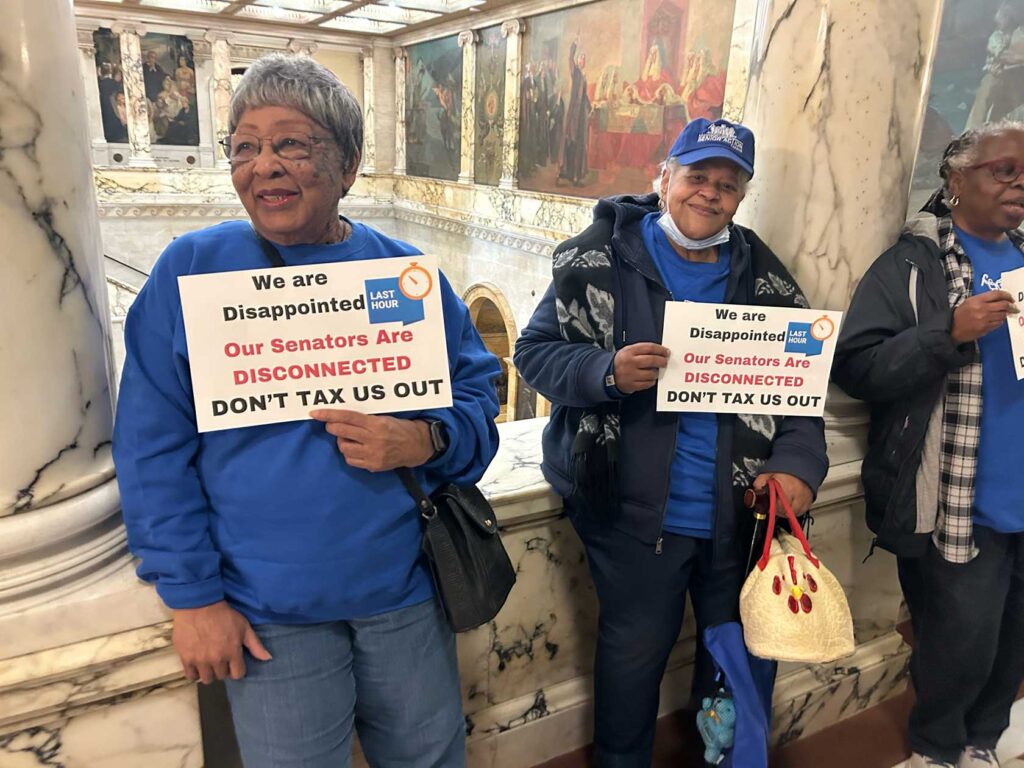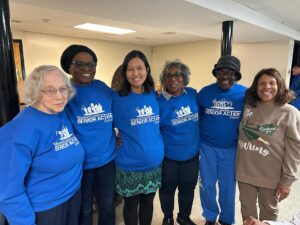Mass. Senior Action Council disappointed with city’s property tax increase

Members of the Mass. Senior Action Council are devastated and hurt after hearing the final decision on Dec. 9 that there will be a 10.4% increase in property taxes from the city of Boston.
Carolyn Villers, executive director of the Mass. Senior Action Council, said that their members have been working to hold senators accountable and bear witness to the legislative process leading to this decision.
“We’re very frustrated and disappointed in legislators as they began to say that was not an extreme increase. And I think [and] felt that the senators were minimizing the impact of that increase. [They are] really out of touch with certainly a lot of seniors on fixed incomes,” she said.
Villers also shared some of the effects that seniors will be facing now that the tax increase has been decided.
“So, [for] the majority of our members, Social Security is their only, or primary source of income and retirement. This year, they’ll have a two and a half percent cost of living increase, which, when we think about that, compared to the 10 and a half percent increase in property taxes. I think again, you know, part of what our members have spoken about is, as homes assessed values go up, the property taxes go up, their insurance goes up,” said Villers.
She added, “This increase also comes in the month of January, with bills due February 1. That’s the peak of the heating season. So you know, higher utility costs, and also Medicare costs go up in January as well. And so, you know, health care costs, they’re often in deductible periods. And so not only is that increase difficult, but the timing is particularly difficult.”
Many seniors have had to refinance their homes and may have mortgages, which helps to spread out the impact of that, said Villers. However, she pointed out that for those homeowners who have owned their homes for decades and no longer have a mortgage, they have to pay the property tax bills quarterly.
“The whole quarterly payment is due February 1, and that’s a significant increase when there really is no increase or comparable increase in their cost-of-living income. So we have, certainly, through this process, talked with many seniors who, particularly with the higher increase, fear that it might be the straw that broke the camel’s back, if you will. This might be that tipping point where they might lose their home,” she said.
Villers also said that they have heard from others that they will now have to make substantial cutbacks in other areas of their lives, including keeping the heat down lower, reducing food budgets and reducing their ability to get around and socialize with others.
While the increased amount has gone down throughout the process, Villers said that this is still going to create significant harm and hardship for their members and their loved ones.
“I’ve heard from our members, too. While homeowners will have the most immediate and direct impact, it’s also worth recognizing that the increase will be passed down to many renters in what is already very unaffordable rent because much of our rental property is small, three family homes,” she said. “As people pay higher taxes, many of them will either be forced or choose to pass that down to their renters.”
Villers added that this also brings back memories for some of the members who have lived through the history of being displaced in the past.
“I’ve heard people say, ‘Well, I remember when they pushed us out of the West End, and then it was the South End, and in Roxbury and Dorchester.’ … Folks who have worked, invested [in] and built the city … feel that their ability to age and spend their retirement years in the city that they built and raised their families in is really at risk,” she said
Lastly, Villers said that her organization is planning to continue the discussion and look at property tax relief or other ways to really support people being able to age in place. She also wants to reevaluate the pilot program, which looks at having universities who have taken over parts of their neighborhoods and caused some of the displacement in the community step up and invest in these communities through monetary donations or other in-kind options — as they, along with nonprofits are exempt from property taxes.
“50% of the land in Boston is owned by nonprofits and is not subject to property tax. So obviously that’s a very large footprint, which means that only 50% of the land that’s taxable is actually making up that revenue source,” said Villers. “That includes colleges, universities, hospitals and museums. With large institutions, there’s a program in place … called the pilot program, payment in lieu of taxes. So again, they’re not required to pay taxes because they’re nonprofits. Nonprofits that have property valued over $15 million, I believe, pay a percentage of what they would have paid in property tax if it was taxable land.”
“I think half of that is supposed to be contributed in cash, and half of it can be in-kind. So for a university that could be scholarships to people in the community, but when you look at the reports and things of those institutions, what we can see is that very few institutions are meeting their voluntary contributions,” said Villers.
“And even the in-kind contributions often are not really about the communities of which they’re a part. And so, as we think about our taxes [that] help make up our revenue stream, which helps services and investments in the communities that we need, everything from schools to senior services … and not wanting to see cuts to the budget, that would in many ways harm the same communities that might struggle with a property tax increase. I think that since so much of the land is owned by large nonprofit institutions, [we are] really saying, ‘Well, [there] should be more that they are doing to really contribute to the city that they benefit from,” she added.
Sherry White, one of the Senior Action Council members, said that it was a big letdown to hear the decision that was rendered on Dec 9.
“I believe it was dismissed by the Senate. It was a huge disappointment, and that has everything to do with the fact that it seems that the state and the powers that be are a lot more invested in business in the city of Boston, versus people who have invested 30,40, 50,60, 70, plus years of living and supporting the city,” said White. “My family is three generations in this home. My dad bought this property in 1946 and passed it on. My parents passed it on to me, and then for me, it will go to my daughter. And then, hopefully, if the building’s still standing, it’ll go on for a little bit more, but that … increase, I so object to it.”
She added, “We’ve worked as educators, healthcare professionals, city workers, on every and all levels, we’ve been people who’ve maintained our properties, paid our taxes, taught our children pride in their homes and neighborhoods and communities, and taught them to give back to those communities. But it seems like this is becoming a city with no soul.”
White also wonders in terms of the property tax increase, what is really behind it when it comes to seniors, especially since many of them are on fixed incomes.
“Is there an intent to force financial stress that forces older homeowners to choose between paying taxes and other essentials with outcomes of depleted health, home laws, home sale and displacement?” she asked.
She also considers the property tax increase’s impact on young community members.
“I look at young people who may finally be able to get that chance to buy that first home for themselves and for the families that they’re developing, an increase can absolutely devastate those dreams,” said White.
People like her want to age in place and this increase puts this possibility at risk for many seniors, she said.
“It’s really compromised in Massachusetts, [as it] finds it all right to tax people of Boston out of their homes, the seniors with years, the threat of not having that cherished home where love, learning and laughter can continue, will be eroded, and in both instances, so will the vitality of this city of Boston,” she said.
Sharon Keyes, another Senior Action Council member, shared that this decision was very disappointing to her.
“You’re talking about $1,400 or $1,600 that homeowners have to come up before January 1. Not only are we all on fixed incomes, but that money, that Social Security and that pension, also has to take care of utilities, food, insurance and other responsibilities within and in that home. We all have older homes, like myself, that we have to fix up. And we’re not talking about $100. We’re talking about thousands of dollars. And I don’t care what our homes are worth, it impacts all of us, not only seniors, but those who want to be homeowners, and others that are just making it check by check. This is going to start the new year with such hardship that is not funny. … It really hurts,” Keyes said.







